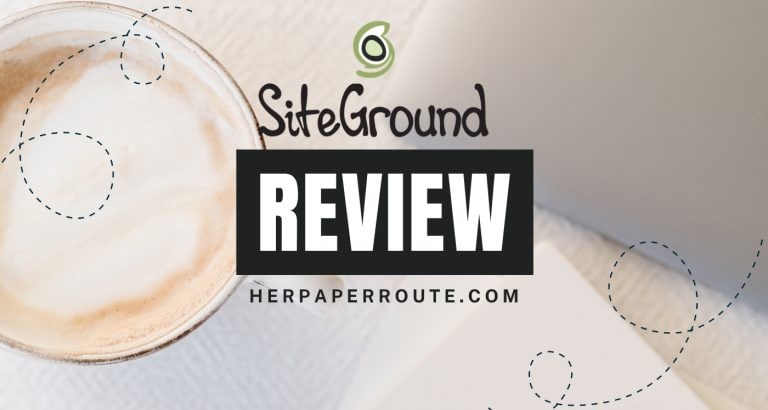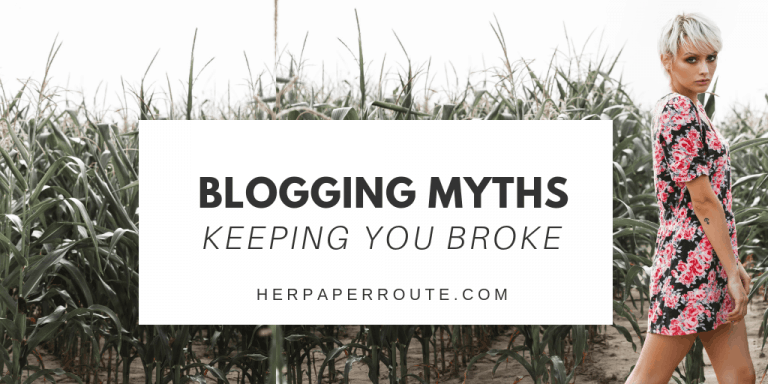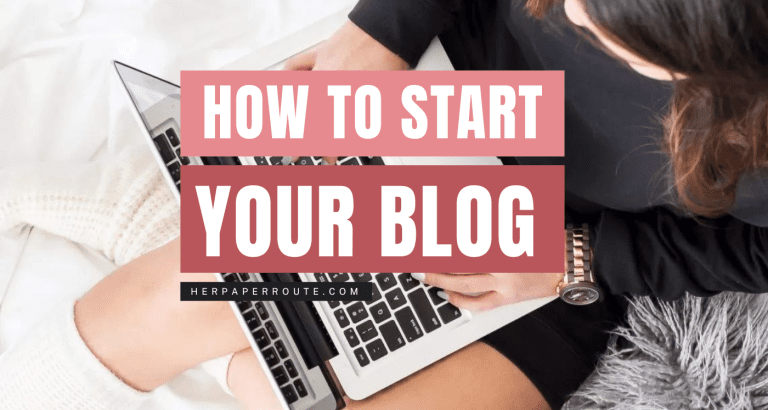Blogging For Beginners – 10 Ways To Build A Successful Blog

Blogging for beginners can be an overwhelming undertaking. From what starts as an idea that you might like to start a blog, soon turns into a whirlwind of confusion.
There really is a lot to learn when you are a new blogger, and there is a lot of information out there telling you different things.
As an affiliate partner of various brands and sponsored content, HerPaperRoute may earn commission on qualifying purchases. Disclaimer
As someone who has been running 6 figure blogs for a while now, I know what it takes to make a profitable blog.
But I also know that it can feel really overwhelming in the beginning stages of starting a blog too! So today I want to share with you 10 blogging tips for beginners that simplify the main blogging basics you should focus on.
Everything else can be learned over time – but if you make these 10 blogging basics your focus, you will be off to a successful start!
Blogging For Beginners – 10 Blog Tips To Start A Successful Blog
If you’re interested in starting a blog for profit, or have a blog that’s not performing as well enough, this post is for you!
There are a few core blogging tips that can help you make more money with your blog.
Let’s explore the following blogging for beginners basics.
1. Choose Your Niche Carefully
Defining your niche, aka the main topic around your area of expertise is important – both for SEO purposes, as well as for developing your authority.
It’s best to be interested in your subject matter or an expert in your field.
But it’s also important to have a defined niche when it comes to making money from your blog.
Sometimes a more narrow focus can be more profitable as it’s easier to optimize and if there are targeted affiliate products available.
Having a specific niche will also make it easier for you to grow and monetize your email list.
When you have a targeted niche audience reading your emails, you know what they like, and you can sell specific products to them, over and over.
Blogging for beginners tip: If you are too general in what you write about, you will have to general an audience, and it will be harder to sell to them.
Generally, it’s best to plan for a broad topic and optimize small sub-topics within the blog.
I offer a Niche Authority Hacker course, you can enroll in it for free!
This course which will help you develop your niche and your own authority in the market.
2. Self-Host From The Start
Self-hosting is the term for professional websites, hosted on a proper server.
You are self-hosting when you run your blog on WordPress.org, which is free via your web hosting provider.
Not self-hosting is when you use a third-party platform like Tumblr, Wix or WordPress.com – those types of platforms are not recommended.
They are very expensive as they don’t allow you to monetize your site or run your own ads.
Non-self-hosted platforms charge for upgrades and don’t allow full customization of your layout. No good!
This is why it is important to start your blog on WordPress.org, as you will fully own your website this way, and have full ability to customize your site and monetize it however you wish.
Follow our very simple step-by-step guide to starting a self-hosted blog with SiteGround, here.
Or, follow this guide to self-host with BigScoots.
WordPress.org is an easy-to-use interface and the #1 platform in the world for website creation.
Truthfully, it is very easy to use WordPress.org! You don’t need to know how to code or anything tech-wise.
We have beginner-friendly WordPress tips for you every step of the way as well.
3. Create Categories That Make SEO Sense
Blogging for beginners is usually more about writing content they themselves want to write, and less about what other people want to read. Don’t be one of those bloggers!
If you want your blog to be discovered, it’s important that you actually write on topics that people are actively searching Google for, using keywords that people are using in searches.
From your WordPress dashboard, create your primary categories or topics geared toward key phrases related to your subject matter.
Identify the search strength of keywords (use Google Keyword tool) and make the most popular phrases your categories.
You can learn how to do keyword research by enrolling in our free SEO Made Simple course.
4. Write Blog Titles Using Words That People Are Searching For
Make a list of article titles that you plan to write using the keyword phrases that you’re targeting.
Not only will these blog titles get SEO recognition for your blog once they are posted, but this step will help you stay focused when you don’t know what to write!
Check out these headline generator tools and tips for writing click-worthy headlines:
5. Create Easy-To-Read Content
The easier your blog posts are to read, the more likely people will want to read them.
- Don’t use big words or dense paragraphs
- Create lists like this article with 1-3 sentence paragraphs broken up by a space
- Make your paragraph font 16px or bigger
- Use photos wherever possible
- Always make sure each article gives the reader something of value
6. Don’t Wait To Grow Social Followers
Growing your blog’s following takes time, so start now! Your social media followers will provide the fuel for your primary traffic.
Create social accounts for your blog on Facebook, Twitter, Instagram and most importantly, on Pinterest.
Pinterest has the power to grow your blog traffic like wildfire, so don’t overlook this one!
Learn Pinterest Marketing and pin your content and related content from other bloggers in your niche. I like to use Tailwind to help automate my pinning.
It may also be worth it to set up a feed of your blog posts on networks like Bloglovin, and other feed burner type platforms.
Make it very easy for people to share your blog posts, be sure to add hard-to-miss share buttons to your website.
I recommend this social share plugin for this, that’s what I use on all of my websites!
On that note, I’d love it if you followed me on Pinterest @HerPaperRoute.
7. Flex Your Guest Post Writing Muscles
Identify guest posting opportunities where you can submit your material to higher ranked sites.
Websites that accept guest posts usually allow you to include a couple of links to your blog which will provide excellent exposure for your new blog.
This will help build your backlinks, as well as improve your own website’s DA (domain authority.)
8. Don’t Wait To Build Your List
Start a newsletter for visitors to sign up for your weekly email and special offers.
This helps build your target audience and will help keep people interested in your blog.
I use ConvertKit for my email marketing, subscriber management, and newsletter sending.
It is the best email e=service provider there is, and highly recommend them.
Blogging for beginners tip: To help grow your list, offer a freebie incentive (aka an opt-in) to encourage sign-ups.
For example, when you join my list you will get a free copy of my Blogging StartUpKit, as well as a very helpful blog tip from me each week, to help you monetize your blog.
I also send invites for paid blogging opportunities and inclusion in my Pinterest boards to members of my list.
So if you are a blogger, whether you are a pro or in the ‘blogging for beginners stage’ my list is a great list to be on!
9. Monetize Now, Not ‘Someday’
There is no reason to ‘wait’ until you have more followers / more traffic / more xyz. You should monetize your blog the day you launch it!
Waiting to monetize is literally throwing away money for no reason.
Implement the most easily manageable monetization vehicles to your new blog; Google Adsense, Amazon Associates, and affiliate programs.
Write sponsored posts and reviews, offer sponsored link opportunities, and create digital products to sell.
To learn all about affiliate marketing, check out my free affiliate marketing guides, and enroll in the affiliate marketing course.
The program has helped thousands of new bloggers to start earning money, even with brand-new blogs.
Starting a blog can be super overwhelming. There really is a lot to learn when you are a #newblogger. Focus on these 10 #bloggingbasics & you will have a #successfulblog in no time! #blogtips #bloggingtips10. Write, Write, And Write Some More!
Of all the blogging for beginners tips, the most important is the content you create.
The more you put into creating great content, the better.
Write well-researched articles that have more than 1000 words at a minimum.
The more value you can provide for your reader, the more valuable your blog will be.
Watch your blog grow organically in followers, traffic, and profit as people share your amazingly thoughtful content.
No blog tip is more important than creating consistent and compelling content.
Blogging For Beginners – Keep Reading
30+ Tasks, After Installing WordPress
How To Make Your Website Super Fast
Tips For New Bloggers, From 21 Pro Bloggers
Follow along on Instagram!









